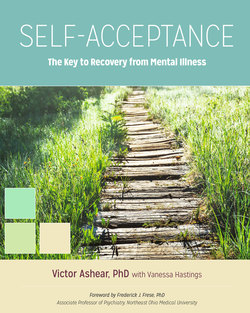Читать книгу Self-Acceptance - Victor Ashear - Страница 8
На сайте Литреса книга снята с продажи.
ОглавлениеForeword
I experienced my first psychotic break in the mid-1960s. During the next few years I was hospitalized several times and, in the summer of 1968, I was picked up by the police in the street in Columbus, Ohio, and taken to a nearby state psychiatric hospital. Before long I was brought before a probate court, where I was apprised that I had schizophrenia and was being judicially committed as an insane person. I was further informed that schizophrenia is a deteriorating brain disease and that from time to time while I might appear to recover, people with schizophrenia virtually never recover. I was told that I could expect my condition to deteriorate with time, and I would probably spend the rest of my life under the care of the state psychiatric hospital system.
I later learned—thanks to the thinking of Emil Kraepelin, the German psychiatrist who more than 100 years ago first described the condition that came to be known as schizophrenia—that psychiatric professionals generally believed for most of the twentieth century that people diagnosed with schizophrenia would never recover.
Fortunately, our understanding of serious psychiatric conditions has improved greatly during the past few decades. We now have solid evidence that many, perhaps even most, people diagnosed with serious mental illness can, in fact, recover, at least to some degree. This understanding became particularly widespread with the landmark publication of Mental Health: A Report of the Surgeon General in 1999 and the President’s New Freedom Commission on Mental Health’s Achieving the Promise: Transforming Mental Health Care in America in 2003. The latter document’s primary recommendation was to revolutionize the mental health system of the United States, with recovery as the primary goal of the new system. Subsequently, the federal government’s Substance Abuse and Mental Health Administration (SAMHSA) took the lead in encouraging mental health professionals throughout the country to engage in practices oriented toward “recovery.”
The term “recovery” can, of course, have different meanings to different people. Although some mental health professionals and advocates now believe that virtually anyone diagnosed with schizophrenia can totally recover, most tend to take a more measured approach to recovery. Most believe the majority of people with serious mental illness can make significant improvements with treatment but will continue to experience at least residual symptoms and remain vulnerable to episodic periods of psychosis.
This fairly recent optimism concerning the likelihood of recovery for people with serious mental illness has given rise to a variety of “recovery-oriented” approaches to caring for those of us in this population. Overall, the recovery approach emphasizes independence, autonomy, and responsibility on the part of the person with serious mental illness.
Despite these messages from national leaders, it has been difficult to overcome mental health professionals’ pessimism concerning recovery for seriously mentally ill people and the tendency to marginalize them. Indeed, relatively few professionals, including psychologists, have taken a serious interest in developing and/or providing recovery-oriented services for us.
Perhaps it is not surprising that some of the first mental health professionals to forge specific recovery-oriented approaches to care received treatment for serious mental illness at one time and are now themselves “in recovery.” Patricia Deegan, PhD, a psychologist who is in recovery from schizophrenia, has developed several recovery-oriented approaches. Her work on developing “shared decision making” has been particularly impressive. Beth Baxter, MD, who is also in recovery from schizophrenia, worked with Sita Diehl to develop the BRIDGES program, in which recovering people provide guidance to other people in recovery. Dan Fisher, MD, PhD, yet another psychiatrist who has been diagnosed with and hospitalized for schizophrenia, has developed a recovery approach that he calls Emotional CPR (eCPR). Information about Dr. Fisher’s initiatives is available from the National Empowerment Center at http://www.power2u.org.
Of course, other mental health professionals have developed approaches to recovery-oriented care without ever experiencing serious mental illness firsthand. Examples include cognitive behavioral therapy (CBT), which uses systematic goal-oriented procedures to address dysfunctional cognitive patterns, maladaptive emotions, and self-defeating behaviors, and cognitive enhancement training (CET), which is designed to improve neurocognition, social cognition, and social adjustment for adults with schizophrenia or schizoaffective disorder.
Along these lines, it is so good to see that clinical psychologist Victor Ashear, PhD, has developed another tool for people in recovery. After working for many years with seriously mentally ill veterans under the care of the Veterans Health Administration, Dr. Ashear has drawn on his substantial experience to develop a workbook specifically to give guidance to people with serious mental illness.
With Self-Acceptance: The Key to Recovery from Mental Illness, Dr. Ashear has developed a step-by-step approach that focuses on improving self-acceptance to achieve optimal recovery. He delineates five skills areas on which recovering people can concentrate, providing them with a practical template which, when followed, holds the promise of adding yet another dimension to the concept of recovery-oriented care. I can see why initial feedback concerning the effectiveness of this program, which until now has primarily been employed with veterans, has been so positive.
Those of us in recovery from various forms of psychosis and other serious mental disorders greatly appreciate the skills and efforts of Dr. Ashear and other mental health professionals who are or may become similarly dedicated.
Frederick J. Frese, PhD
Associate Professor of Psychiatry
Northeast Ohio Medical University
